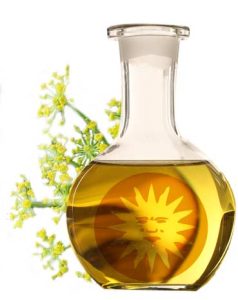Bitter Fennel Essential Oil (Foeniculum vulgare)
At Esencias Lorente, we are pleased to introduce our Bitter Fennel essence, a unique and distinctive essence used in a variety of industrial applications. Extracted from bitter fennel seeds through steam distillation in stainless steel stills, our Bitter Fennel essential oil is characterized by its invigorating aroma and subtle herbal notes. Widely used in the food, pharmaceutical, and cosmetic industries, Bitter Fennel essential oil adds a touch of flavor and aroma to a variety of products, from beverages to personal care items. At Esencias Lorente, we are dedicated to providing the purest and most authentic Bitter Fennel essence, ensuring its quality and freshness to meet the needs of our most discerning customers. Trust us to bring the quality and aroma of Bitter Fennel to your industrial products with our premium essential oil.
Description: Liquid aspect essential oil as well as yellow coloured and fresh herbaceous smell.
Bloom: It blooms from June to the end of autumn.
Growth: It grows all over the peninsula and it is cultivated in Murcia. It is a wild plant.
Composition: This essence is composed by Alpha-Pinene, Beta-Pinene, Anethole and D-Limonene.
Use: It is used in Perfumery, Aromatherapy and it is also the main component of the beverage RICARD, PASTI.
TECHNICAL TABLE OF BITTER FENNEL ESSENCE
ORGANOLEPTIC INFORMATION
PHYSICO-CHEMICAL INFORMATION
CHEMICAL COMPOSITION (Active Ingredients)
The essential oil of bitter fennel (Foeniculum vulgare amara) is obtained from the seeds of the fennel plant. Here are some of the common chemical components that can be found in the essential oil of bitter fennel:
- Anethole: Is the main component of bitter fennel essential oil and gives it its characteristic aroma and flavor. It is also found in other plants such as anise and has antibacterial properties.
- Fenchone: Present in variable amounts, this compound also contributes to the flavor and aroma of bitter fennel. Fenchone has antioxidant properties and may have effects on the nervous system.
- Methyl chavicol (estragole): This compound has antioxidant properties and is also found in other herbs and spices.
- Limonene: A terpene common in many citrus essential oils, it provides refreshing properties and may have health benefits.
- Alpha-pinene and Beta-pinene: Terpenes that contribute to the aroma and may have antimicrobial properties.
It’s important to mention that the exact proportions of these components can vary depending on the variety of fennel, the extraction method, and other environmental factors. Additionally, the essential oil of bitter fennel is used in aromatherapy, traditional medicine, and the food industry, but its use should be moderate and always with caution, especially in pregnant women, breastfeeding mothers, or people with certain medical conditions.
Description of Bitter Fennel
Bitter fennel (Foeniculum vulgare), also known as wild fennel or fennel weed, is a perennial herbaceous plant belonging to the Apiaceae family. It is commonly found in Mediterranean regions, although it can also grow in various parts of the world. Unlike sweet fennel (Foeniculum vulgare var. dulce), bitter fennel has a stronger and less sweet taste.
Habitat and Plant Characteristics: Bitter fennel is a plant that can reach heights of up to 2 meters. It has erect, hollow, and striated stems, with feathery and finely divided leaves resembling those of the carrot plant. The flowers are small and yellow, arranged in umbels.
Aroma and Flavor: Unlike sweet fennel, bitter fennel has a stronger and more bitter taste. Both the leaves and seeds have a characteristic fennel aroma.
Uses and Applications of Bitter Fennel (Foeniculum vulgare):
- Culinary: Despite its more intense flavor, bitter fennel is used in cooking, especially in Mediterranean cuisine. The leaves and seeds are used as a seasoning to add flavor to salads, soups, stews, and fish dishes.
- Medicinal: In some herbal medicine traditions, bitter fennel has been used for its potential digestive and carminative properties. It is believed to help relieve indigestion and flatulence.
- Infusions and Teas: Bitter fennel seeds can be used to prepare infusions or teas, often consumed to aid digestion or as a relaxing drink.
- Aromatherapy: The essential oil of bitter fennel is used in aromatherapy for its distinctive scent and is believed to have stimulating and relaxing properties.
- Garden Care: Bitter fennel is also sometimes grown in gardens as an ornamental plant and to attract pollinators.
